- Home
- Juliet Marillier
Den of Wolves Page 16
Den of Wolves Read online
Page 16
One look told me I needed to act quickly or I would lose both Fann and her unborn child. There were several women tending to her, and they’d been doing a good job, or as good a job as untrained helpers could. The hut was warm; a girl was keeping an eye on the fire, on which a pot of water bubbled. They’d been burning lavender and rosemary.
‘I’m Blackthorn, the healer,’ I said, rolling up my sleeves. ‘Someone make a brew. For yourselves, not for Fann. And have something to eat, all of you. I’ll need you alert and strong.’
‘I’m Fann’s mother.’ An older woman, her hair showing threads of silver, came up next to me as the others busied themselves. She looked wrung out, but was holding her voice steady. ‘My name is Ide. We’re so grateful you were prepared to come all this way, Mistress Blackthorn.’
‘Be glad that Osgar rode to fetch me; a pity it wasn’t earlier. Never mind, we’ll do our best. Tell me how this has gone so far. When did her pains start?’
‘Just after supper last night. But not strong until the middle of the night, and it was well after sun-up when she felt the need to push.’ Ide lowered her voice, turning away from her daughter. ‘It was hard. Very hard. She tired herself out. Now she can’t push anymore. And the pains have died away.’
Danu save us. ‘This is her first child?’
‘That’s right. Ross, that’s Fann’s husband, works on the barges, loading and unloading.’
As she spoke I examined Fann; felt the tightly distended belly, noted the slow pulse, the pallid skin slick with sweat, the eyes that did not quite seem to see me. I attempted a reassuring smile. ‘Good work, Fann, you’re doing well. Someone pass me my bag, will you?’
One of the women brought it over and I got out the finely shaped wooden instrument Grim had made for me. ‘I use this to listen to what’s happening in there,’ I said, knowing from experience that folk found the process frightening if they did not understand. I put one end of the instrument against the taut skin of Fann’s belly and set my ear to the other. ‘Everyone quiet now.’
All the women went still. I could hear the rain coming down again outside, but within the house it was as if even the spiders in the corners and the mice in the walls were waiting for the reassurance of life.
‘Good,’ I said after a little, aiming for a briskly competent tone. I hoped I had not imagined that faint sound, a tiny, tentative drumbeat. ‘We need to get this baby out as quickly as we can. He – or she – seems to be the right way around. But we need to get things moving along. Now, I can smell that someone here knows their herbs. Do you have calamint? In particular, the kind with small greyish flowers? And ordinary garden thyme?’
‘Thyme, yes,’ Ide said. ‘But not the calamint; I didn’t think we’d be needing it. Curse me for a fool!’
‘Can it be gathered close by?’
Fann groaned, moving her head from side to side.
‘Not in the garden here. Up on the edge of the woods there may be a plant or two. If I’d thought earlier . . .’
‘Someone must run up there and gather it. Now. Someone who can find the right thing straight away. I’d go myself, but I need to stay with her.’ I prayed that this would not come to a choice between mother and infant. I had never had to cut a child from the womb, but I had seen it done when a woman would have died anyway, and it was a brutal, bloody business.
There was silence in the room, save for Fann’s breathing.
‘Does anyone know exactly where the plant grows? We must make up a tea to get labour started again. A very strong infusion. I need the herbs right now. Or as soon as you can possibly get them.’ I promised myself I would never again let the supply of dried calamint in my healer’s bag run out. Never. Though the fact was, the fresh herb was far more effective.
‘Up by the old hut,’ Ide said. ‘Where that strange woman used to have her garden, you remember, the one folk said was fey?’ She glanced at the others. ‘If there’s calamint anywhere, it’s there. Only,’ she said, looking at me, ‘it’s all overgrown. Turned to wilderness long ago. The son buried his whole family close by the place. Father, mother, wife. Folk have given it a wide berth ever since.’
The others were avoiding my eye. It seemed that even with their friend at risk of her life, nobody was going to volunteer.
‘I can’t run,’ Ide said. ‘My joints are too stiff. And I’m the only one likely to find the right plant in all the weeds around the old hut. Apart from yourself, Mistress Blackthorn.’
‘Can someone take you on horseback?’ Morrigan save us, did they plan to wait until Fann expired right before their eyes?
‘Not all the way there. It’s off the track. Too steep for horses.’
There was only one answer. ‘Start making a tea with fresh thyme,’ I said. ‘Strong. See if you can get Fann sitting up, or even walking around if she can manage that. Keep on sponging her face. Let her sip warm water. I’ll be back in a moment.’ Grim was not a wise woman or a druid. But he was a gardener. And he could run.
16
~Grim~
Quicker to ride up as close as I can to this hut and run the last bit. Hoping I can find the plant she needs. From the sound of it, if there was a garden once, there isn’t anymore. Osgar gets me a horse, asks if I want someone to come with me and I say no. I can see nobody wants to do it. An old man points out where the place is, a bit downhill from two massive beeches, no missing them.
‘There used to be a path,’ says the old man. ‘When the builder fellow lived there. Bardán, his name was. It’ll be a bit grown over; he’s been gone years and years. But you can see where to head off the main track. Post still standing, though the sign’s gone. You can tie up the horse there.’
Bardán. Morrigan’s britches! As if I didn’t already have too much to think about. No time to ask questions now. I tell Ripple to stay with the others; no need for her to get wet and tired all over again. Then I get on the horse and head off. Try to put my thoughts straight while I’m riding up to the forest. First thing, calamint. Remind myself what it looks like. Pick the wrong herb and this woman could die because of me. Baby too. Got to be quick, got to get it right. Second thing, Blackthorn. I rushed back to the cottage for her bag, saw the writing tablet on the shelf, thought, good, this is my chance to rub out those words I wrote. Only when I opened up the tablet my words were gone. Something else was written there. Written by her. Hurry or no hurry, nothing was going to stop me reading it.
Who is this man?
Strength in his hands
Truth in his eyes
Love in his heart
Honour in his spirit
His name is Grim.
Just as well she wasn’t there when I read that. Filled me up with feelings. Blushing all over my big ugly face. Tears in my eyes. Couldn’t believe she’d written that about me. Me, Bonehead that was. She must’ve liked what I wrote, or she’d never have done that. Didn’t have time to sit and look at it then, but I made sure I remembered it, every word. Struggled with honour for a bit, first time I read it, but I worked it out. Brother Galen would’ve been proud of me.
Still thinking about it now. What it might mean. If I’m being foolish to think it might mean what I’d like it to mean. Wishing Mathuin was dead and buried so she could stop worrying and maybe let herself have time for . . . Nah. Doesn’t pay to get ahead of yourself, Bonehead. Let yourself dream too deep, and sure as sure the next thing will be a nasty wake-up, bucket of slops in the face like in the lockup. So I go on to the third thing that’s in my mind. Bardán. The wild man. Bardán the builder, who used to live in this hut I’m heading for. Not so far from Tóla’s house at all, only on the other side of the wood. If what those folk were saying is true, Bardán had a mother and father and a wife, and they’re all buried up there. Danu save us. No wonder the man’s half-crazy. Loses his whole family, then ends up in the Otherworld for years and years. And some time in the middle of th
at he was building the heartwood house and stopped with the place half-finished. Must be folk in these parts who know more about all that, what happened to him, the bits he still can’t remember. But that can wait. The herbs can’t.
Doesn’t take long to get there. I tie the horse to the post and head in on foot. Not much of a path left; that fellow was right about nobody coming this way anymore. Only not quite right, because when I get to the old hut, someone’s there before me.
I stop dead in my tracks. Bardán. Bardán, who’s not allowed to leave Wolf Glen. Bardán, all the way over here, sitting on the broken steps outside the hut. Face all tears. Something in his hands, an old cloth of some kind.
‘Grim,’ he whispers, and gets to his feet. Ready to run, is my guess. Looking as wild as he did the day I first saw him.
‘It’s all right,’ I say, quiet-like. Thinking of trying to catch a dog or a horse that’s spooked. Thinking how slow and careful you have to be, not to send them bolting in panic. ‘I haven’t come to look for you. I need to pick some herbs – calamint – for Blackthorn. My friend, you know, the healer. Woman down in Longwater giving birth, or trying to. Need to find the plant in a hurry.’ Cast my eye over what might have been a garden, long ago. Remains of a drystone wall, something that could have been a path. Stuff growing everywhere, all under and over and tangled through itself. Maybe there’s calamint there, but finding it’s going to take time. And that’s what I haven’t got.
Behind Bardán, the door to the hut’s open. Place looks like a nice shelter for spiders and birds and field mice, not much more. But it’s been a home once. Bits and pieces of furniture still in there, a bed, a table, one or two crocks and cups. Like he just walked off and left the lot, all those years ago. And nobody’s come near since.
Want to ask him what he’s doing here, and doesn’t he know he’ll be in big trouble with Tóla. But there’s no time. ‘Could you help?’ I ask instead. ‘The calamint. Need it in a hurry. Don’t know where to start looking.’
Bardán’s not hearing me. Tears still coming fast. ‘Every birdling in the wood,’ he murmurs. ‘Feather bright and feather fine . . .’
He’s in no fit state to help. He’s the one who needs help, but I’ve got to find this herb and go, quick as I can. There’s wormwood by the old wall, breaking free of the long grass. Yarrow. Lavender. Row of spiky thistles on guard. I head over there, squat down, start pulling out grass, hunting for calamint. Fresh green leaves, smallish; strong smell when you crush them. Grey flowers. What if that woman dies, and the child, all because I’m not up to the job Blackthorn’s trusted me with?
‘Woman,’ says Bardán, making me jump. He’s right behind me. Didn’t hear him move. ‘What woman?’
‘The one in labour? Fann, her name is. Her man works on the barges.’ All the time I keep hunting through the grass and weeds. ‘Brother called Osgar. He’s the one came to get us. Me and Blackthorn.’ Why can’t I find what I want? ‘Must’ve been your garden once,’ I say. ‘Herbs, flowers, vegetables for your family.’
‘I helped him,’ Bardán said. ‘Dad. Made the rows straight. Like a builder. He showed me. Mama sat on the steps and sewed her pictures. Singing, always singing. Feather bright and feather fine, none –’ He stops, just like that. Like there’s a wall there, stopping him from saying the next bit, whatever it is. ‘See?’ he says instead, and holds out the rag he’s been clutching. ‘She made this.’
Seems like nothing much. But I remember Blackthorn’s red kerchief and how that ended up being a lot more than it looked like. So I take the thing from Bardán’s hands and spread it out. Full of holes, fraying away, faded and tired. But beautiful; like a lovely dream. Finest thing I’ve seen in a long while. Before it got old this was a picture of birds done in bright wools. A piece you’d be proud of if you were the maker. Big enough to hang on the wall; pretty enough to fill up the little house with happiness. All different sorts of birds on it, perfect down to the last feather. Small, big, in between, from a little snippet of a wren to a swan with its wings spread wide. You wouldn’t think an ordinary woman like Bardán’s mother could make such a thing. For work like that you’d need a touch of the uncanny in your hands. But then, if that story he told was the true tale of his parents, she was part-fey. His mother. Ran away from the Otherworld in company with a boy who was switched for a changeling.
‘The last one,’ Bardán says, stroking the embroidery with a crooked finger. ‘Fading away.’
‘Someone with clever hands could mend this,’ I tell him. Wish I could comfort the fellow, but this is a deep-down grief. Those tears, they’re not over his mother’s embroidery, or not only that. He’s crying for the past, for the lost, for what couldn’t be. Know that feeling well. Know how it eats out your insides, so kind words don’t help anymore. ‘There’s one or two of the women at Winterfalls, Lady Flidais’s handmaids, who do fine work like this.’
Bardán snatches the ragged cloth from me, holds it to his chest like it’s a treasure. Which in a way it is.
‘It’s all right.’ Keep my voice soft; try not to rush things. ‘I wouldn’t take it from you. Bardán, I need the herb. Calamint. If you can remember where it is, please help me.’
‘Kind,’ Bardán says, coming out from wherever he was for long enough to see me properly. ‘Grim. Kind. Over there, at the corner.’
And there it is, half-hidden under a giant comfrey plant. Surprised it’s been getting enough sun. There’re enough fresh leaves on it for a brew. Hope so, anyway. I bend to pick, and there’s Blackthorn’s voice in my head: Take what you need, but leave enough – make sure you don’t kill the plant. Remember to say thank you.
‘Thank you,’ I say under my breath. ‘You might save a life today. Two lives. Owe you a big debt.’ I’m not sure if I’m thanking the plant, or some sort of force that helps things grow, or maybe a god. Or God. Been thinking about him a lot since I was at St Olcan’s.
Got to rush back. ‘I have to go, Bardán,’ I tell him. ‘If I don’t get these leaves down there quick enough that woman could die.’ Leaving him here by himself feels wrong. I know he’ll be in big trouble with Tóla for going away. Even though today wouldn’t have been a work day, and even if he’s only visiting his old house. Don’t like the thought of him facing up to the master on his own. ‘I can come back in a bit, if you –’
He’s got his head in his hands. Shoulders shaking. The bit of cloth over his knees, where he sits on the steps. ‘The blood,’ he sobs. ‘So much blood . . . They didn’t come. They wouldn’t come . . . And she . . . she was so white, white as snow, and all the red . . .’
He’s weeping so hard I can hardly make out the words. Morrigan’s curse, I can’t walk off and leave him like this. ‘Who, Bardán?’
‘Dáire. My Dáire. Here, here, I’ll show you.’ He drops the embroidery on the steps. Takes my arm, leads me around the path and up behind the hut to a spot I can tell straight off is a grave. Everywhere else is overgrown. But this patch has been weeded today, from the looks of it. Pile of long grass and bits and pieces to one side. All freshly pulled. Must’ve been a hard job with his hands the way they are. What’s left is the remains of the grass and a few daisies popping their little heads up here and there. And three stones. Names carved into them, two I can’t read for the moss and the wearing away. Third one starts with a D. Dáire, I’m thinking. The others I can guess, since I’ve heard the story down in Longwater, or part of it anyway.
‘Your mother and father?’
Bardán manages a nod. ‘And . . .’ He kneels by Dáire’s grave marker, bows his head. Voice comes out sort of strangled. Seeing the past like he’s right back in it, that’s my guess. Back in the worst of it. ‘So much blood. How could there be so much? And the little face, the little eyes . . . She never even . . . she never . . .’
‘Dáire . . . your wife?’ Hard to think of the wild man as married, settled, plying the trade his father taught
him. Sounds as if she died in childbirth. Poor sod lost wife and infant both. No wonder he’s a bit wrong in the head.
Bardán nods. ‘Wanted to show you.’
‘I’m sorry. Hard for you. Very hard.’ Explains a lot. Though not everything. ‘Bardán, I have to go back to Longwater. I have to go right now. But I’ll come up later, when Blackthorn’s finished down there. Walk you over to Tóla’s, if you want. The master won’t be happy you’ve left the place and neither will Gormán. Be easier for you if I come too.’ Soon as I’ve said it I have second thoughts. If he headed off now, he’d be back there much sooner. Rain still coming down on and off. Could be nobody’s noticed he’s not there. Might all be indoors, keeping dry. He could slip back in, no trouble. And it could take a long time for this child to be born. Even if it’s quick, there’s things that could go wrong. Badly wrong. Blackthorn might need me for a while. Most of the day, even. ‘If you don’t want to wait for me, just go,’ I tell him. ‘I can’t tell you how long I’ll be. Will you be all right here?’ Stupid question. This man will never be all right again. Lost too much. Doesn’t mean I should stop helping him, though. Poor sod.
‘Go,’ Bardán says. ‘Go quick. Save them.’
17
~Blackthorn~
Women came in and out of the cottage, bringing food and drink, making sure there was firewood and fresh water and anything else I asked for. Men wandered up to the door from time to time, wanting to ask questions but not quite prepared to put them into words. In the end I told them to go next door and stay there or I’d be tempted to turn the lot of them into newts. It had been a long, long time since I had said such a thing.
Grim gave the men jobs to keep them occupied. Both Osgar and Fann’s husband Ross were among those gathered in the next-door house. I sent one of the women over to let them know we’d given Fann the draught and were anticipating that things might speed up now, and she reported back that on Grim’s instructions the men were busy stacking firewood under cover, drawing water from the well, and cooking batches of flat-cakes. Grim and I knew from experience the disastrous results that might come from drinking mead on an empty stomach, especially if a person was already upset or tired. Once or twice we heard them singing over there.

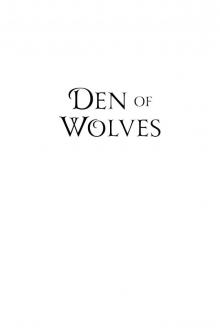 Den of Wolves
Den of Wolves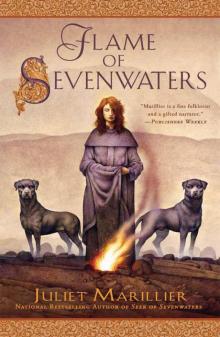 Flame of Sevenwaters
Flame of Sevenwaters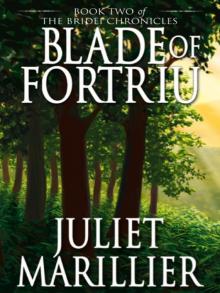 Blade of Fortriu
Blade of Fortriu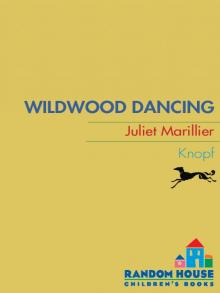 Wildwood Dancing
Wildwood Dancing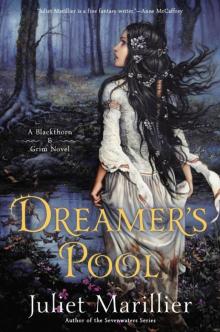 Dreamer's Pool
Dreamer's Pool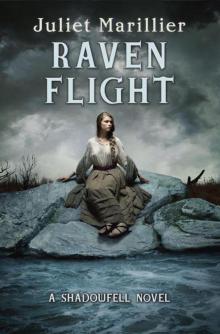 Raven Flight
Raven Flight Heir to Sevenwaters
Heir to Sevenwaters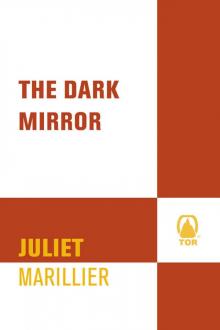 The Dark Mirror
The Dark Mirror Daughter of the Forest
Daughter of the Forest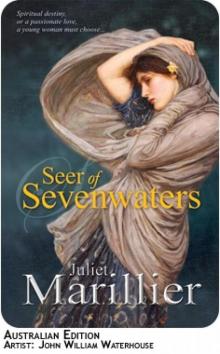 Seer of Sevenwaters
Seer of Sevenwaters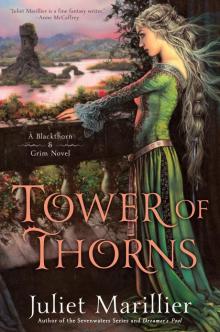 Tower of Thorns
Tower of Thorns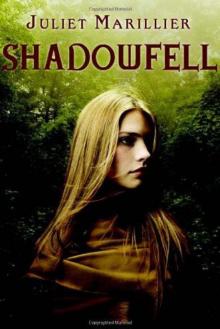 Shadowfell
Shadowfell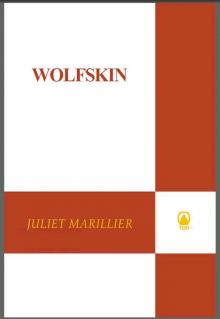 Wolfskin
Wolfskin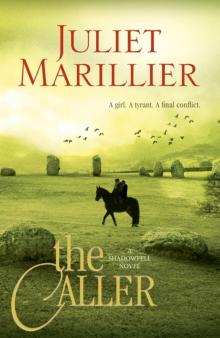 The Caller
The Caller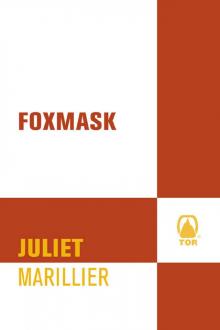 Foxmask
Foxmask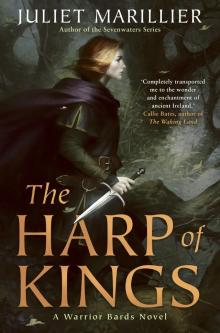 Harp of Kings
Harp of Kings The Well of Shades
The Well of Shades Heart's Blood
Heart's Blood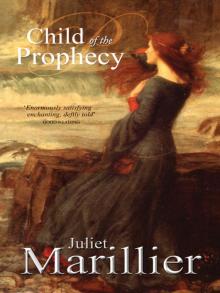 Child of the Prophecy
Child of the Prophecy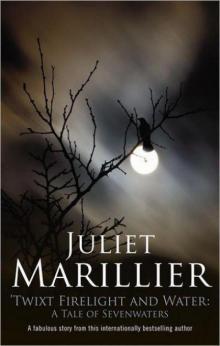 Twixt Firelight and Water
Twixt Firelight and Water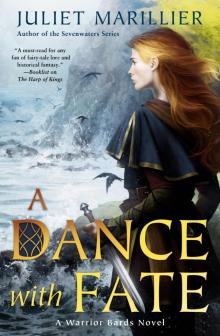 A Dance with Fate
A Dance with Fate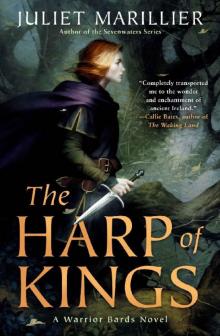 The Harp of Kings (Warrior Bards)
The Harp of Kings (Warrior Bards)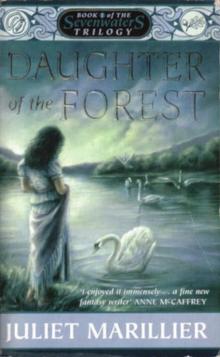 Daughter of the Forest (The Sevenwaters Trilogy)
Daughter of the Forest (The Sevenwaters Trilogy)![Sevenwaters [06] Flame of Sevenwaters Read online](http://i1.bookreadfree.com/i2/04/08/sevenwaters_06_flame_of_sevenwaters_preview.jpg) Sevenwaters [06] Flame of Sevenwaters
Sevenwaters [06] Flame of Sevenwaters![[Sevenwaters 04] Heir to Sevenwaters Read online](http://i1.bookreadfree.com/i2/04/12/sevenwaters_04_heir_to_sevenwaters_preview.jpg) [Sevenwaters 04] Heir to Sevenwaters
[Sevenwaters 04] Heir to Sevenwaters